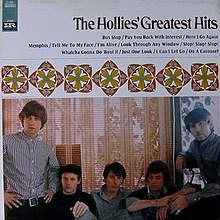
The Hollies are a British pop rock band, formed in 1962. One of the leading British groups of the 1960s and into the mid-1970s, they are known for their distinctive three-part vocal harmony style. Allan Clarke and Graham Nash founded the band as a Merseybeat-type group in Manchester, although some of the band members came from towns further north in East Lancashire. Nash left the group in 1968 to form Crosby, Stills & Nash, though he has reunited with the Hollies on occasion.

"Bus Stop" is a song recorded and released as a single by the British rock band the Hollies in 1966. It reached No. 5 in the UK Singles Chart. It was the Hollies' first US top ten hit, reaching No. 5 on the Billboard charts in September 1966. In Canada the song reached No. 1 and was their second top ten hit there.

Graham Keith Gouldman is an English singer, songwriter, and musician, best known as the co-lead singer and bassist of the art rock band 10cc. He has been the band's only constant member since its formation in 1972. Before 10cc, Gouldman worked as a freelance songwriter and penned several hits for major rock and pop groups such as the Yardbirds, the Hollies, Herman's Hermits, and Ohio Express, among others.

Harold Allan Clarke is an English rock singer, who was one of the founding members and the original lead singer of the Hollies. He achieved international hit singles with the group and is credited as co-writer on several of their best-known songs, including "On a Carousel", "Carrie Anne", "Jennifer Eccles" and "Long Cool Woman in a Black Dress". He retired from performing in 1999, but returned to the music industry in 2019. Clarke was inducted into the Rock and Roll Hall of Fame in 2010.

In The Hollies Style is the second album by the British rock band the Hollies and was released in November 1964 on Parlophone Records. It missed the official Record Retailer album chart in the United Kingdom, which at the time only had a total of 20 available spots. In Canada, it was released on Capitol in October 1965, with an altered track listing.

Evolution is the first of two albums released in 1967 by British pop rock band the Hollies. It is their sixth UK album and peaked at number 13 in the UK album chart.
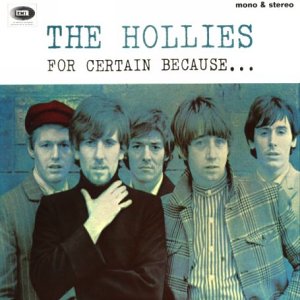
For Certain Because is the fifth UK album by the Hollies and their second released in 1966. It was the first Hollies album in which all the songs were written by members Allan Clarke, Graham Nash, and Tony Hicks, and the first on which they did not use the songwriting pseudonym "L. Ransford". It was also the first Hollies album recorded with new bassist Bernie Calvert replacing Eric Haydock. In Bobby Elliotts' book "It Ain't Heavy, It's My Story" he explains how he came up with the title "For Certain Because" by taking the 3 words from the children song Teddy Bears' Picnic.
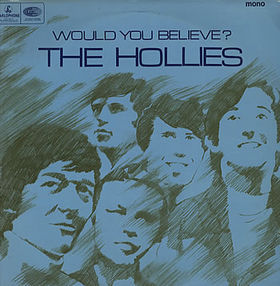
Would You Believe? is the fourth UK album by the Hollies, released in 1966.
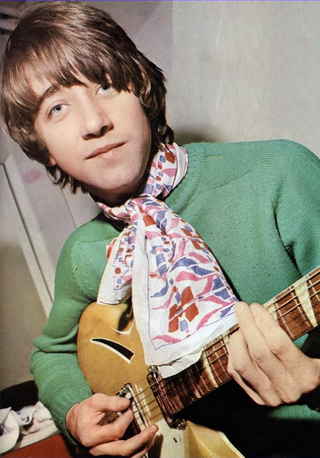
Anthony Christopher Hicks is an English guitarist and singer who has been a member of the British rock/pop band the Hollies since 1963, and as such was inducted into the Rock and Roll Hall of Fame in 2010. His main roles within the band are lead guitarist and backing singer.
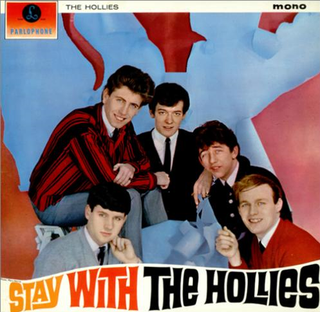
Stay with The Hollies is the debut album by the British rock band the Hollies and was released in January 1964 on Parlophone Records. In Canada, it was released on Capitol in July 1964, with a different track listing. In the US, Imperial Records issued the album under the title Here I Go Again in June 1964 to capitalize on the moderate success of the singles "Here I Go Again" and "Just One Look". It also features covers of well-known R&B songs, not unusual for Beat groups of the day.

Hollies is the Hollies' third studio album for Parlophone. It is also referred to as Hollies '65 to differentiate it from the similarly titled 1974 album. It went to No. 8 in the UK album charts. Originally available in mono only, it was reissued in stereo under the title Reflection in 1969. In 1997, British EMI put both mono and stereo versions of this album onto a single CD.

The Graham Gouldman Thing is the debut album by singer-songwriter Graham Gouldman, later a founding member of 10cc.
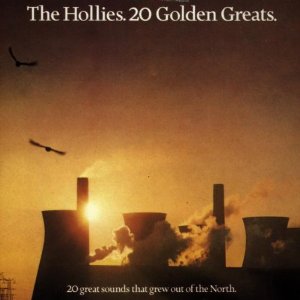
The Hollies: 20 Golden Greats is a compilation album by The Hollies, CDP 7 46238 2, produced in 1978 by EMI by Ron Richards. The album cover's subtitle is "20 great sounds that grew out of the North." The album peaked at No. 2 in the UK albums chart.

The Hollies' Greatest Hits is a compilation of singles by the Hollies, released on Epic Records in April 1973. It includes hit singles by the group on both the Epic and Imperial labels over a time span of 1965 to 1972. It spent seven weeks on the Billboard 200 charts, peaking at number 156.

"On a Carousel" is a song written by Allan Clarke, Graham Nash and Tony Hicks. It was released by the Hollies as a single in February 1967, having been recorded the previous month, on the Parlophone label in the UK and Imperial in the US. Nash would opine: "'On a Carousel' was one of the Hollies' best songs. It's a pop song with an infectious chorus, but flirts with gorgeous shifts in rhythmic texture [that keep] the melody from becoming predictable. And the lyric captures the essence of young love without the usual moon-and-June cliches. We knew it was a hit from the get-go."

Clarke, Hicks & Nash Years: The Complete Hollies April 1963 – October 1968 is a 6-CD box set released in the United Kingdom by EMI Records in 2011. As the title suggests, it encompasses, in chronological order by recording date, almost every song The Hollies have released to date that was recorded between April 1963 and October 1968, when Graham Nash left the band. Included were 14 previously unreleased tracks such as French-language versions of hit songs, alternate stereo mixes and a live set from the Lewisham Odeon recorded 24 May 1968. Besides various mono and stereo mixes of tracks, previously released material excluded from the set were the alternate version of "Stay" from the 1988 UK The Hollies: Compacts for Pleasure CD and the longer Take 9 of "Poison Ivy" from their first Australian LP.

Hollies' Greatest is the only number one album in the UK by British band the Hollies. It was released shortly before Graham Nash's departure from the Hollies and was intended to include all of their British hit singles with Nash, as well as filling in for the lack of an original LP by the group in 1968. Only 3 of the 14 songs on the album – "Stay", "I Can't Let Go" and "Stop! Stop! Stop!" had previously been released on U.K. albums.

Bus Stop is the fourth U.S. album by the British pop band the Hollies, released on Imperial Records in mono (LP-9330) and rechanneled stereo (LP-12330) in October 1966. It features songs ranging from both sides of the band's then-current hit single to material recorded in the Hollies' early days on the UK's Parlophone Records in 1963, 1964 and 1965. The song "Oriental Sadness" had previously been issued in the U.S. on the Hollies' album Beat Group! earlier in 1966.
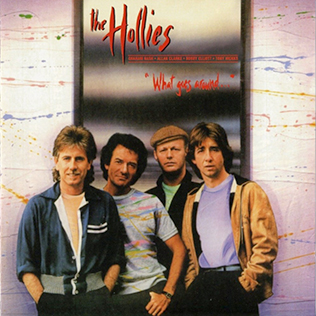
What Goes Around... is the 21st UK studio album by English rock/pop group, the Hollies. It includes their version of The Supremes' "Stop! In the Name of Love", which became their last US hit single. The Hollies reunited with Graham Nash for this album and for the following US tour. The LP was the band's first and last album with Nash since Butterfly (1967) and also their last one with lead singer Allan Clarke. Among the guest musicians, you can find Brian Chatton who was formerly keyboardist for The Warriors with Jon Anderson, and Flaming Youth with Phil Collins.
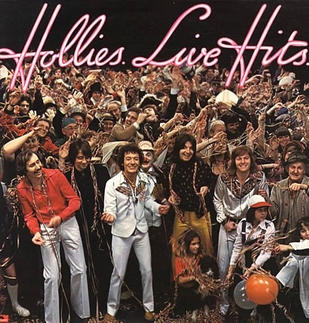
Hollies Live Hits is the first live album by the Hollies, released in 1977. It reached number four on the UK Album Chart.
